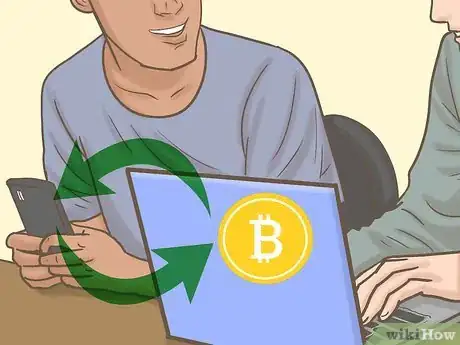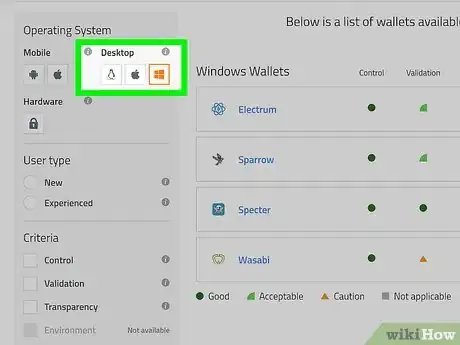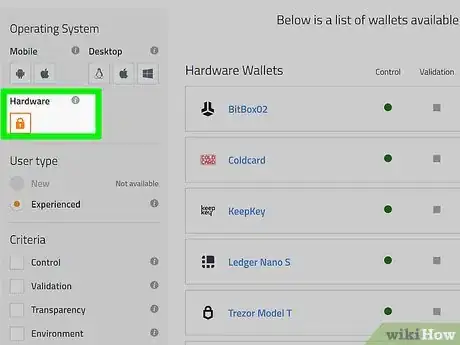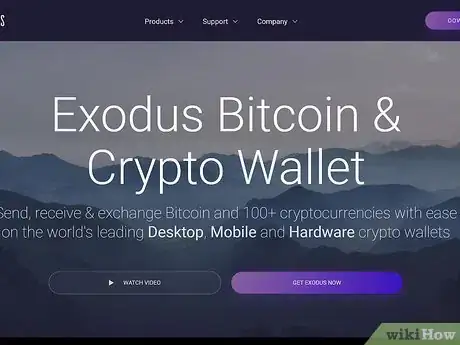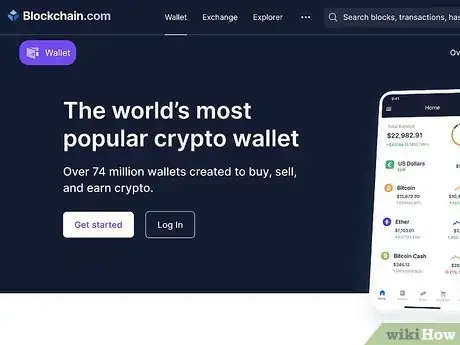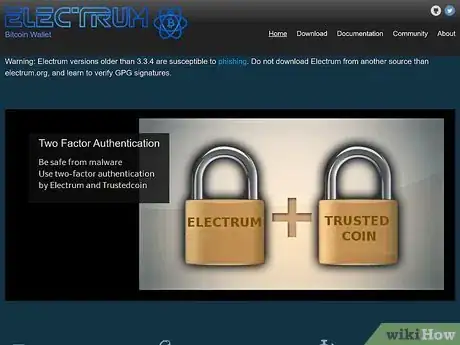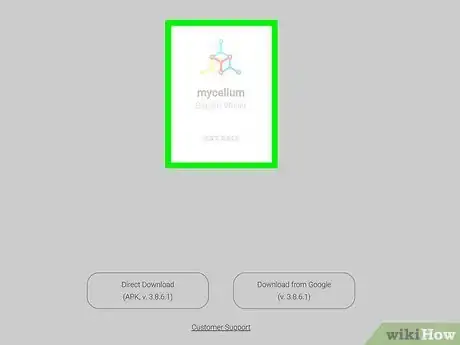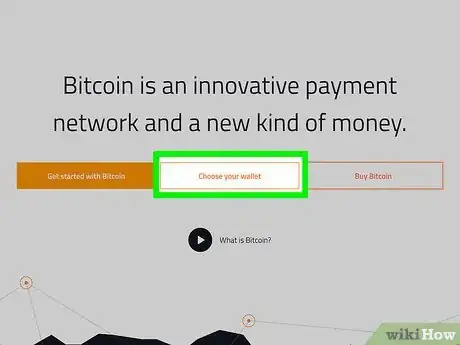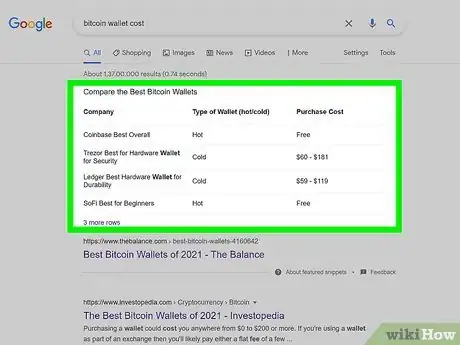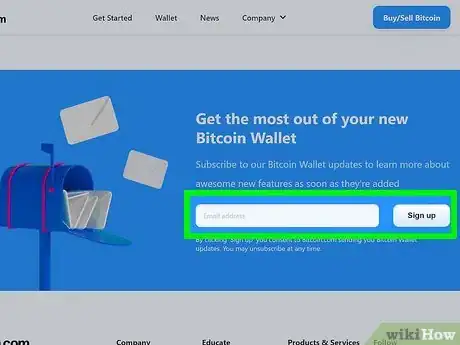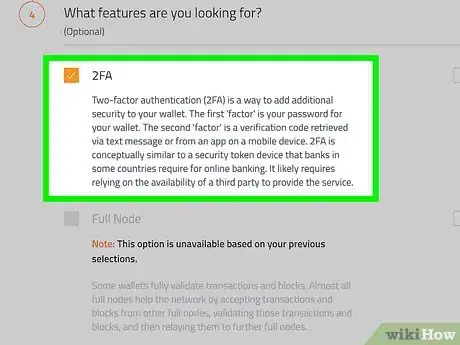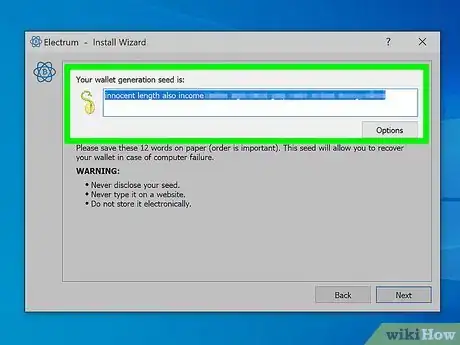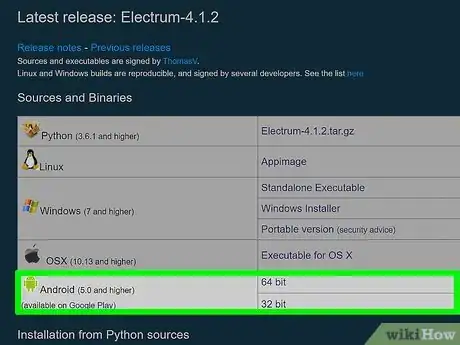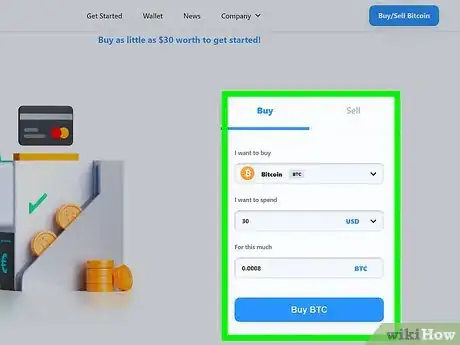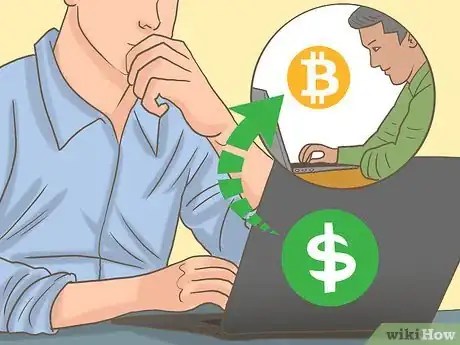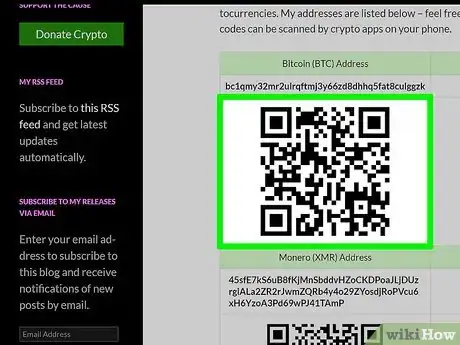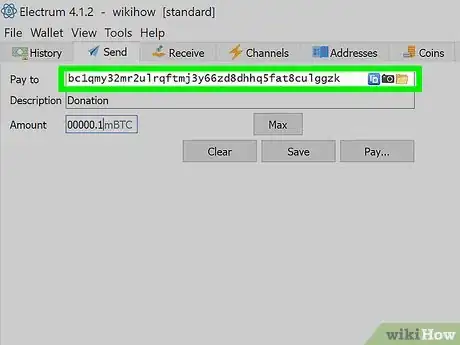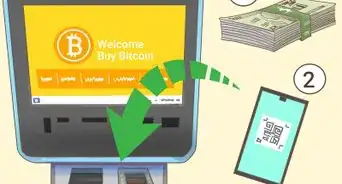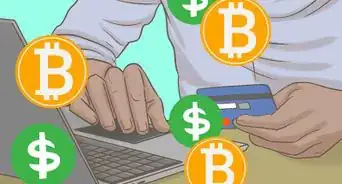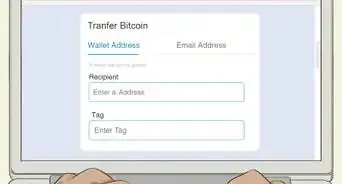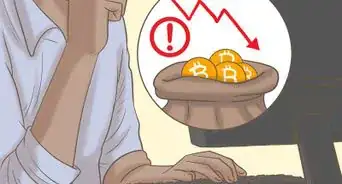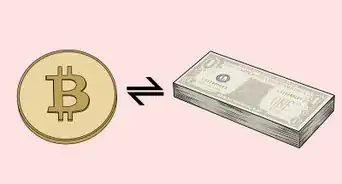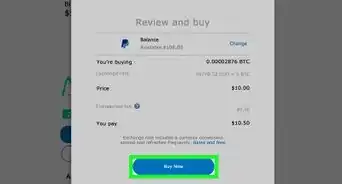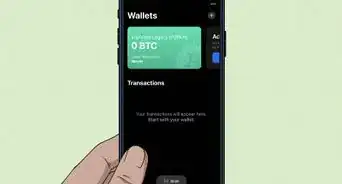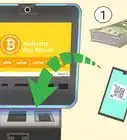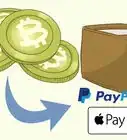This article was co-authored by Gonzalo Martinez and by wikiHow staff writer, Jennifer Mueller, JD. Gonzalo Martinez is the President of CleverTech, a tech repair business in San Jose, California founded in 2014. CleverTech LLC specializes in repairing Apple products. CleverTech pursues environmental responsibility by recycling aluminum, display assemblies, and the micro components on motherboards to reuse for future repairs. On average, they save 2 lbs - 3 lbs more electronic waste daily than the average computer repair store.
There are 12 references cited in this article, which can be found at the bottom of the page.
This article has been viewed 422,769 times.
If you're thinking about buying Bitcoin or some other cryptocurrency, you'll need a wallet to store it in. Wallets also allow you to send and receive Bitcoin from others. Online wallets (also known as "web wallets") are typically the easiest ones to start with. But how do you set one up and use it? Here, we've compiled answers to some of your most common questions about how to create and use an online Bitcoin wallet.
Steps
What kinds of Bitcoin wallets are there?
-
1Online wallets are typically easiest for beginners. An online wallet is just like an online bank account and the interface is relatively easy to navigate. Because many online wallets also have mobile apps, you can access your Bitcoin anywhere.[2]
- One major drawback of online wallets is that instead of storing your private keys on your own device, online wallet providers generate and store your keys online.[3] If you've ever heard the phrase "not your keys, not your coins," it's referring to this—if you don't have custody of your keys as you would with a downloadable or hardware wallet, your funds can be withheld by the wallet provider at any time.[4] You're responsible for keeping your account safe.
- Another downside of online wallets lies in their very nature. Since they're always online, they're always vulnerable to hackers. If an online wallet provider is hacked, you could lose your coins forever. Review security features very carefully when choosing an online wallet, and refrain from storing large quantities of Bitcoin on the web.
-
2Software wallets allow you to keep your Bitcoin on your personal computer. Because your Bitcoin keys are kept on your computer, not online, software wallets are much safer than online wallets. However, they're only as safe as your computer, so make sure you have strong security and firewalls in place before you download a software wallet.[5]
- Many companies that offer software wallets have connected online or mobile wallets. It's a simple option if you're concerned about the vulnerability of keeping all your Bitcoin in an online wallet (even if you don't have that much of it).
-
3Hardware wallets are the most secure option for holding Bitcoin. If you're holding large amounts of Bitcoin, or if you plan on holding it for a long time, a hardware wallet is your safest bet. Because they're not connected to the internet, you don't have to worry about hackers stealing your stash.[6]
- Because they're not online, they're not convenient if you plan to use Bitcoin for day-to-day purchases. You might consider also having an online wallet where you keep a small amount of Bitcoin for that purpose, in addition to a hardware wallet—kind of like having a savings account and a checking account.
What's the best online Bitcoin wallet?
-
1Exodus is one of the most accessible wallets for beginners. This downloadable wallet has a simple, straightforward user interface and is available through both desktop and mobile apps. It also has strong support features so you can get help if you need it.[7]
- Exodus also holds other cryptocurrencies, so it's a good choice if you're not planning on sticking to just Bitcoin.
- An advantage of using Exodus is that it includes a built-in exchange, allowing you to trade Bitcoin and other cryptocurrencies without leaving your wallet.[8]
-
2Blockchain.com is a truly online wallet. If you're looking for a fully online wallet that you can access in any web browser, Blockchain.com is a simple, popular option. Keep in mind that even though Blockchain.com is a legit company with a functional wallet product, you won't actually own your private keys—they are stored on Blockchain.com's servers rather than your own computer.
- Like Exodus, Blockchain.com supports multiple cryptocurrencies. You can also purchase Bitcoin from within the wallet, as well as trade it for other cryptocurrencies.
-
3Electrum is a downloadable, Bitcoin-exclusive wallet with a hardware option. If you're thinking about adding a hardware wallet at some point to hold the bulk of your Bitcoin, you can do this easily with Electrum. This wallet also has a lot of customization features, which you'll find yourself using more and more if you become more involved.[9]
-
4Mycelium is a mobile-only online wallet with hardware support. Like Electrum, Mycelium allows you to connect and manage Bitcoin in a hardware wallet within its user interface. But unlike Exodus or Electrum, the online wallet is only accessible through a mobile app.[10]
- Users have found that Mycelium can be a bit confusing for beginners, although, with hardware support and the ability to hold multiple cryptocurrencies, it might be something for you to look at if you become more invested in crypto.
-
5Find the best wallet for you through Bitcoin's website. Not all wallets are available for users in all countries, and the most popular wallets might not necessarily have the features you want. Go to https://bitcoin.org/en/choose-your-wallet to use Bitcoin's tool. It will help you choose the best wallet for your needs based on your answers to a few questions.
How can you make your wallet more secure?
-
1Create a strong password and use 2-factor authentication. Securing an online wallet is much like securing your online bank account. The biggest difference is that Bitcoin wallets don't have as many online password recovery options in the event you forget your password—so memorize it or write it down and keep it in a safe place! If you lose access to your wallet, you lose access to your Bitcoin and might not be able to get it back.[12]
- Think of an online Bitcoin wallet as being the same as having a physical wallet with cash. If it's stolen, you have no way of getting it back, so only store as much as you can afford to lose.
-
2Write down your security key and store it somewhere safe. When creating any type of Bitcoin wallet, you'll be shown a security key that looks like several unrelated words in an ordered list. This key is meant to restore your wallet if you ever lose your password. Make sure to write this key down exactly as you see it. Do not take a screenshot or photo of the key and leave it on a phone, tablet, or computer—if someone finds your private key, they can use it to restore your wallet and access your funds. It is extremely important that you never lose this key!
Community Q&A
-
QuestionIs it safer to put your Bitcoin wallet on a phone or a desktop computer?
 wikiHow Staff EditorThis answer was written by one of our trained team of researchers who validated it for accuracy and comprehensiveness.
wikiHow Staff EditorThis answer was written by one of our trained team of researchers who validated it for accuracy and comprehensiveness.
Staff Answer wikiHow Staff EditorStaff AnswerA software wallet on your desktop computer is typically going to be safer than a mobile wallet, assuming your phone has constant internet access. You can use an old phone essentially for cold storage, with nothing on it but your Bitcoin wallet. Then, all you have to do is turn off WiFi when you're not using the wallet. Otherwise, a software wallet is typically safer. Keep in mind, though, that a software wallet on your computer is only as safe as your computer itself. If your computer is vulnerable, so is your Bitcoin.
wikiHow Staff EditorStaff AnswerA software wallet on your desktop computer is typically going to be safer than a mobile wallet, assuming your phone has constant internet access. You can use an old phone essentially for cold storage, with nothing on it but your Bitcoin wallet. Then, all you have to do is turn off WiFi when you're not using the wallet. Otherwise, a software wallet is typically safer. Keep in mind, though, that a software wallet on your computer is only as safe as your computer itself. If your computer is vulnerable, so is your Bitcoin. -
QuestionWhat is the best wallet to hold bitcoins?
 Community AnswerThe best wallet to hold bitcoins is a cold wallet at bitaddress.org or official wallet at bitcoinofficial.org or Bitcoin Core.
Community AnswerThe best wallet to hold bitcoins is a cold wallet at bitaddress.org or official wallet at bitcoinofficial.org or Bitcoin Core. -
QuestionDo I get interest after creating my own bitcoin account?
 Community AnswerNo. A wallet is just for storing your Bitcoin, and there is no way to get interest. Websites that claim to offer it are usually scams so steer away from them. There is no such thing as free money.
Community AnswerNo. A wallet is just for storing your Bitcoin, and there is no way to get interest. Websites that claim to offer it are usually scams so steer away from them. There is no such thing as free money.
Warnings
- As of 2021, Bitcoin is illegal in some countries, including Algeria, Bolivia, Egypt, North Macedonia, Morocco, and Nepal. Many other countries prohibit or heavily regulate the buying, selling, trading, and exchange of Bitcoin without making it illegal to own, including China and Vietnam. Before purchasing or using Bitcoin, make sure you understand your region's laws.⧼thumbs_response⧽
- Bitcoin wallets aren't government-regulated and aren't as secure as bank accounts.[21]⧼thumbs_response⧽
- Bitcoin value is highly volatile, which can make it a very risky investment. Buy Bitcoin wisely, and never invest more than you could afford to lose.[22]⧼thumbs_response⧽
- While Bitcoin is legal in the majority of regions, regulations and tax treatment varies.[23]⧼thumbs_response⧽
References
- ↑ https://www.bitcoin.com/get-started/how-to-get-started-with-bitcoin/
- ↑ https://cointelegraph.com/bitcoin-for-beginners/what-is-bitcoin-wallets
- ↑ https://www.investopedia.com/news/bitcoin-safe-storage-cold-wallet/
- ↑ https://ledger.com/academy/not-your-keys-not-your-coins-why-it-matters
- ↑ https://cointelegraph.com/bitcoin-for-beginners/what-is-bitcoin-wallets
- ↑ https://cointelegraph.com/bitcoin-for-beginners/what-is-bitcoin-wallets
- ↑ https://www.investopedia.com/best-bitcoin-wallets-5070283
- ↑ https://www.exodus.com
- ↑ https://www.investopedia.com/best-bitcoin-wallets-5070283
- ↑ https://www.investopedia.com/best-bitcoin-wallets-5070283
- ↑ https://www.investopedia.com/best-bitcoin-wallets-5070283
- ↑ https://bitcoin.org/en/secure-your-wallet
- ↑ https://cointelegraph.com/bitcoin-for-beginners/what-is-bitcoin-wallets
- ↑ https://www.investopedia.com/articles/investing/082914/basics-buying-and-investing-bitcoin.asp
- ↑ https://www.investopedia.com/best-bitcoin-wallets-5070283
- ↑ https://www.bitcoin.com/get-started/how-bitcoin-transactions-work/
- ↑ https://unhashed.com/cryptocurrency-terms-faq/bitcoin-transaction-fees-explained-complete-guide/
- ↑ https://www.bitcoin.com/get-started/how-to-get-started-with-bitcoin/
- ↑ https://www.bitcoin.com/get-started/how-to-get-started-with-bitcoin/
- ↑ https://bitcoin.org/en/secure-your-wallet
- ↑ https://bitcoin.org/en/secure-your-wallet
- ↑ https://www.investopedia.com/articles/investing/052014/why-bitcoins-value-so-volatile.asp
- ↑ https://www.investopedia.com/articles/forex/041515/countries-where-bitcoin-legal-illegal.asp
About This Article
To create an online Bitcoin wallet, all you have to do is sign up for an account on the website of a company that offers one. Most online wallets also offer mobile apps, so you can access your wallet quickly from your smartphone as well as your computer. While online wallets are typically the easiest for beginners to use, they're also less secure than hardware wallets, which store your Bitcoin data offline. Exodus, Blockchain.com, Electrum, and Mycelium are some of the most highly rated online wallets. When you set up your online wallet, make sure to use a strong password and enable other security features, such as 2-factor identification, to ensure that your Bitcoin is as safe as possible. Only store small amounts of Bitcoin in an online wallet to protect yourself if it gets hacked. If your Bitcoin is stolen, there's no way to get it back. For more tips, including how to get the fastest access to your wallet, read on!
